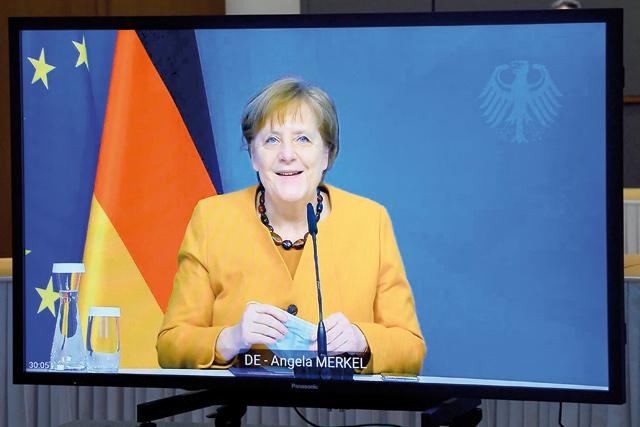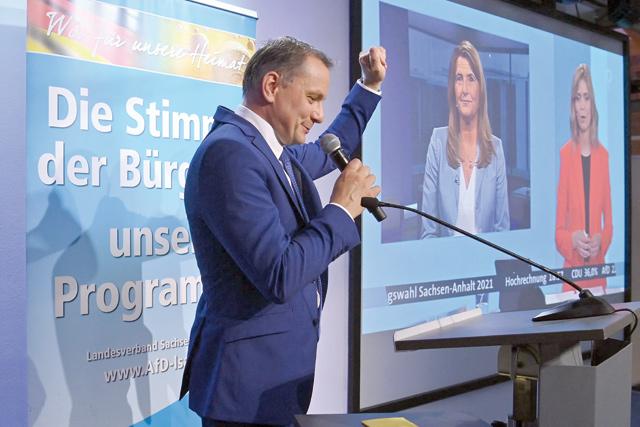You are here
Merkel’s party slumps on COVID woes as German polls loom
By AFP - Mar 08,2021 - Last updated at Mar 08,2021

German Chancellor Angela Merkel is seen on a screen during a video-conferenced meeting with European Council President Charles Michel at the European Council in Brussels on Friday (AFP photo)
BERLIN — With just a week to go before two key regional elections, support for German Chancellor Angela Merkel’s conservatives has hit a one-year low on growing anger over the country’s pandemic crisis management.
Merkel’s CDU/CSU bloc fell to 32 per cent in a survey carried out by the Kantar institute for Bild newspaper on Sunday, a 2-per cent drop on last week that pushes Germany’s biggest political force to its lowest level since March 2020.
“There are many reasons for the decline, and they all have to do with the pandemic,” said Bild.
The slump is bad news for the conservatives ahead of the March 14 elections for regional parliament in the states of Rhineland-Palatinate and Baden-Wuerttemberg.
Both polls are being closely watched as a test of the national mood ahead of Germany’s general election on September 26 — which will be the first in over 15 years not to feature outgoing chancellor Merkel.
In Rhineland-Palatinate, the CDU/CSU has now fallen behind the centre-left Social Democrats (SPD), while the Green party leads surveys in Baden-Wuerttemberg.
Merkel’s centre-right CDU and their Bavarian CSU sister party hit a popularity peak of nearly 40 per cent last spring, when Germany won plaudits at home and abroad for successfully suppressing the first COVID-19 wave.
But Europe’s top economy was hit hard by a virus resurgence at the end of 2020, and Merkel’s coalition government has increasingly found itself in the firing line.
Profiting from masks
Despite months of painful shutdowns, the country’s infection numbers have stopped falling recently.
The slow pace of Germany’s vaccination campaign, snarled by distribution issues and red tape, as well as a delayed start to mass rapid coronavirus testing have further eroded confidence in the government.
Adding to Merkel’s woes is a growing scandal linked to the procurement of face masks early on in the pandemic.
A CSU lawmaker, Georg Nuesslein, was last month placed under investigation for bribery following accusations that he accepted around 600,000 euros ($715,000) to lobby for a mask supplier.
A similar controversy has embroiled CDU lawmaker Nikolas Loebel, whose company pocketed 250,000 euros in commissions for acting as an intermediary in mask contracts. Loebel announced on Sunday that he was bowing out of politics.
The deals drew scathing criticism across the political spectrum, with senior conservatives joining their SPD coalition partners and opposition parties in voicing outrage.
New CDU chief Armin Laschet, who has his eyes on Merkel’s job, said any MP who enriches themself in a crisis was undermining “trust in democracy”.
CSU head and popular Bavarian premier Markus Soeder, himself a possible candidate for chancellor, called it “unacceptable” for elected officials to turn the pandemic into a business opportunity.
‘Enough!’
The latest developments mark a stark reversal of fortune for the conservatives, and observers say the pandemic missteps could cast a long shadow over Merkel’s legacy.
In the early days of the virus fight, Germans uncomplainingly complied with former scientist Merkel’s restrictions, which along with widespread testing and a world-class health system helped keep the coronavirus in check.
Merkel’s own popularity soared to fresh heights, and more than 70 per cent of Germans approved of her government’s handling of the crisis.
That figure has now dropped to just 35 per cent, a YouGov poll found, as the country reels from new and more contagious virus variants, shutdown fatigue and a confusing patchwork of rules across Germany’s 16 federal states.
With Germany’s virus track record no longer the envy of Europe, much of the blame has fallen on Health Minister Jens Spahn — once tipped as a potential Merkel successor.
“That’s enough, Mr Spahn!” the Spiegel weekly wrote last week, calling for his resignation.
“Not enough masks, not enough vaccines, delayed rapid tests. The crisis policies have become a farce,” it said.
“Is this really Germany?”
Related Articles
STUTTGART, Germany — German Chancellor Angela Merkel's conservative party suffered heavy losses in two key regional elections Sunday, early
BERLIN — Chancellor Angela Merkel's conservatives sought on Wednesday to end corruption allegations roiling their ranks over mask procuremen
BERLIN — German Chancellor Angela Merkel’s centre-right party on Monday celebrated a thumping win over the far-right in the last regional vo


















